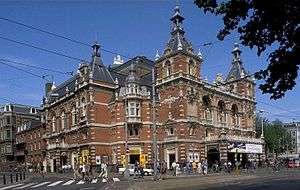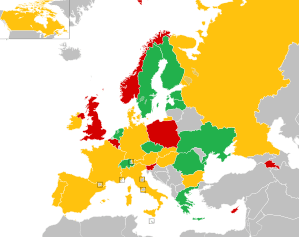Eurovision Young Dancers 2003
| Eurovision Young Dancers 2003 | ||||
|---|---|---|---|---|
 | ||||
| Dates | ||||
| Semi-final | 29 June 2003 | |||
| Final | 4 July 2003 | |||
| Host | ||||
| Venue | Stadsschouwburg, Amsterdam, Netherlands | |||
| Presenter(s) | Aldith Hunkar | |||
| Host broadcaster | Nederlandse Omroep Stichting (NOS) | |||
| Participants | ||||
| Number of entries | 17 | |||
| Debuting countries |
| |||
| Returning countries | None | |||
| Withdrawing countries |
| |||
| Participation map
| ||||
| Vote | ||||
| Voting system | A professional jury chose the finalists and gave points to each performance | |||
| Winning dancers |
| |||
| Eurovision Young Dancers | ||||
| ||||
The Eurovision Young Dancers 2003 was the tenth edition of the Eurovision Young Dancers, held at the Stadsschouwburg Theatre in Amsterdam, Netherlands between 29 June and 4 July 2003.[2] Organised by the European Broadcasting Union (EBU) and host broadcaster Nederlandse Omroep Stichting (NOS), dancers from ten countries participated in the televised final. A total of seventeen countries took part in the competition. Armenia and Romania made their début while Austria, Germany and Ireland withdrew from the contest.[2]
The semi-final took place on 29 June 2003. Each country could send one or two dancers, male or female, not older than 20. All countries except the host (Netherlands) had to take part in the semi final.[2]
The non-qualified countries were Armenia, Belgium, Cyprus, Norway, Poland, Slovenia and United Kingdom. Kristina Oom and Sebastian Michanek of Sweden won the contemporary dance prize, with Jerlin Ndudi of Ukraine winning the classical dance prize. Monika Hejduková and Viktor Konvalinka of Czech Republic won the 'Youth Jury Choice' award.[3]
Location

Stadsschouwburg Theatre in Amsterdam, Netherlands was the host venue for the 2003 edition of the Eurovision Young Dancers.[2] The building is in the neo-Renaissance style dating back to 1894, and is the former home of the National Ballet and Opera.[4]
Format
The format consists of dancers who are non-professional and between the ages of 16–21, competing in a performance of dance routines of their choice, which they have prepared in advance of the competition. All of the acts then take part in a choreographed group dance during 'Young Dancers Week'.[5]
Jury members of a professional aspect and representing the elements of ballet, contemporary, and modern dancing styles, score each of the competing individual and group dance routines. Once all the jury votes have been counted, the two participants which received the highest total of points progress to a final round. The final round consists of a 90-second 'dual', were each of the finalists perform a 45-second random dance-off routine. The overall winner upon completion of the final dances is chosen by the professional jury members.[5]
Results
Preliminary round
A total of seventeen countries took part in the preliminary round of the 2003 contest, of which ten qualified to the televised grand final.[2]
Non-qualified countries
| Country | Name |
|---|---|
| | Kate Lyons |
| | Sébastien Tassin |
| | Natalia Krekou |
| | Anže Škrube |
| | Avetik Karapetyan |
| | Caroline Roca |
| | Jakub Greda |
Final
There were 2 prizes given this year: one for contemporary dance and one for classical dance. A special "young jury" award was given as well by a group of young viewers that were in the audience.[2]
| Prize | Country | Participant | Dance | Choreographer |
|---|---|---|---|---|
| Classical | | Jerlin Ndudi | "Le Corsaire" | M. Petipa |
| Modern | | Kristina Oom & Sebastian Michanek | "Light Beings" | M. Ek |
| Youth Jury's choice | | Monika Hejduková & Viktor Konvalinka | "The Twilight Of Innocence" | Kodel & Vágnerová |
| - | | Maria Seletskaja | "Swan Lake" | M. Petipa |
| - | | Tiina Myllymäki | "Paquita" | Makarova & M. Petipa |
| - | | Elenina Nicolaou | "Paquita" | M. Petipa |
| - | | Linda Siliņa | "La Primavera" | I. Lapsina |
| - | | Joeri Dubbe | "Perfect Skin" | E. Wubbe |
| - | | Ovidiu Matei Iancu | "Swan Lake" | M. Petipa |
| - | | Sarah-Jane Brodbeck | "Don Quixote" | M. Petipa |
Jury members
The jury members consisted of the following:[2]
-
 Russia – Vladimir Vasiliev
Russia – Vladimir Vasiliev -
 Germany – Susanne Linke
Germany – Susanne Linke -
 Italy – Paola Cantalupo
Italy – Paola Cantalupo -
 Netherlands – Derrick Brown
Netherlands – Derrick Brown -
 United States – Liz Imperio
United States – Liz Imperio
See also
- European Broadcasting Union
- Eurovision Song Contest 2003
- Junior Eurovision Song Contest 2003
- Eurovision Young Dancers
References
- ↑ Armenia took part for the first time in the Semi Final since they did not reach the final. Their debut in a Final of the Young Dancers contest took place in 2013
- 1 2 3 4 5 6 7 "Eurovision Young Dancers 2003: About the show". European Broadcasting Union. Retrieved 5 October 2014.
- ↑ "Eurovision Young Dancers 2003: Participants". youngmusicians.tv. European Broadcasting Union. Retrieved 5 October 2014.
- ↑ Martin Dunford (2010). The Rough Guide to The Netherlands. Penguin. p. 74. ISBN 978-1-84836-882-8.
- 1 2 "Eurovision Young Dancers - Format". youngdancers.tv. European Broadcasting Union. Retrieved 8 March 2015.

